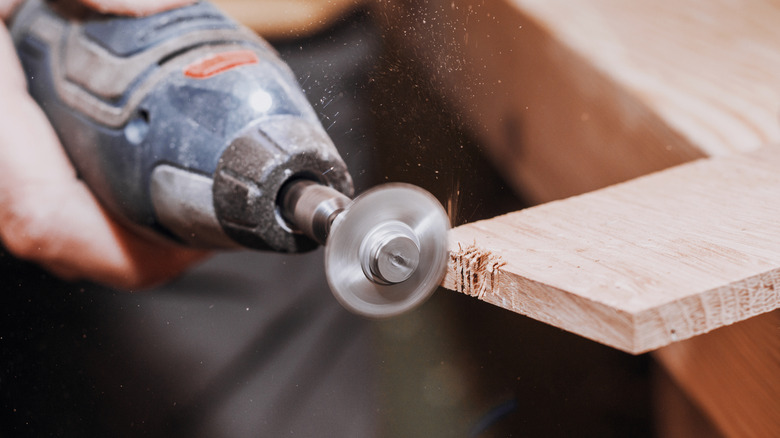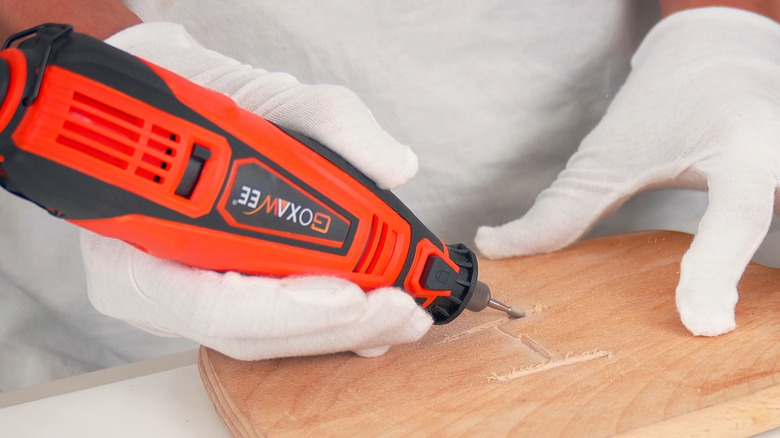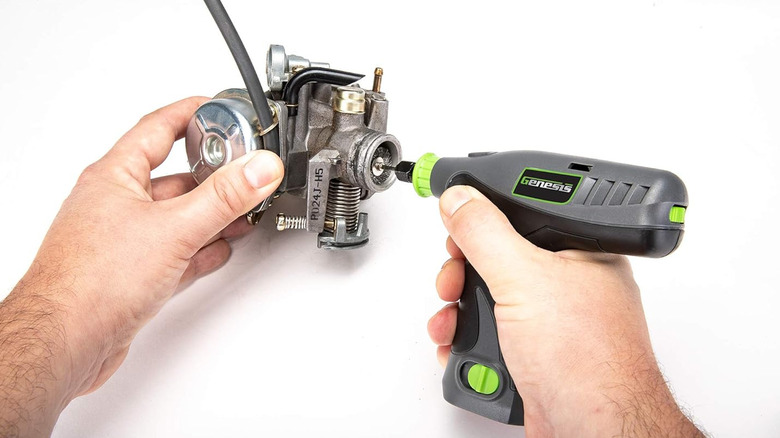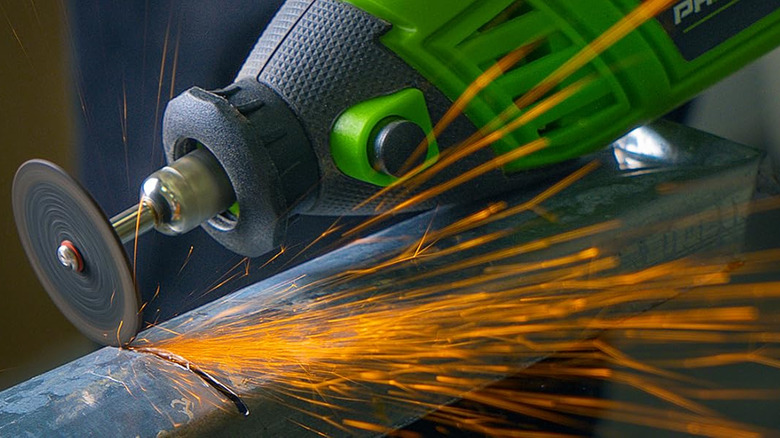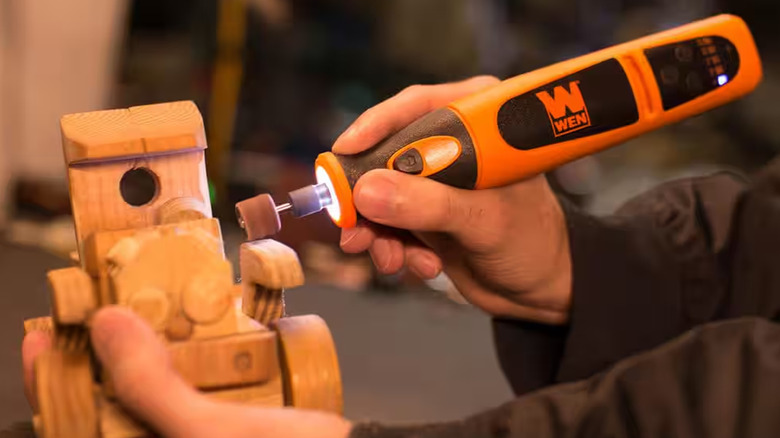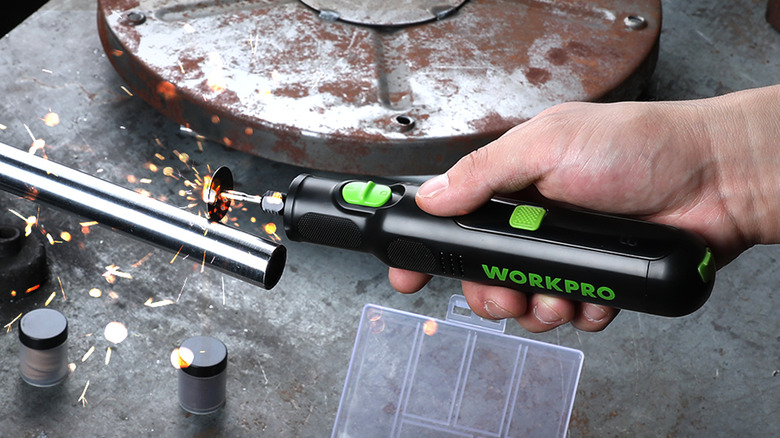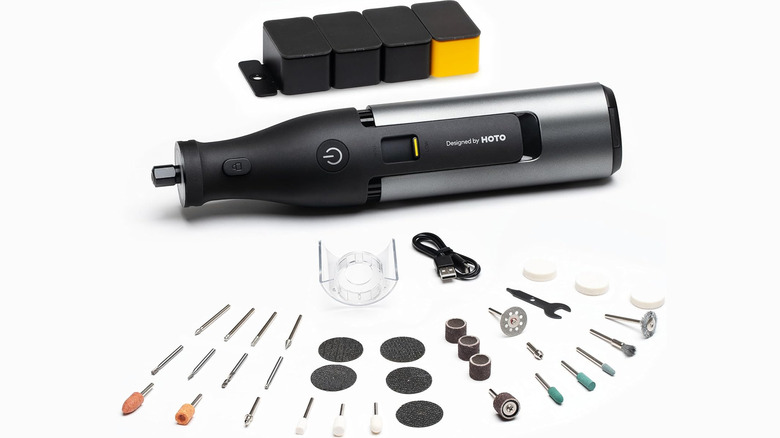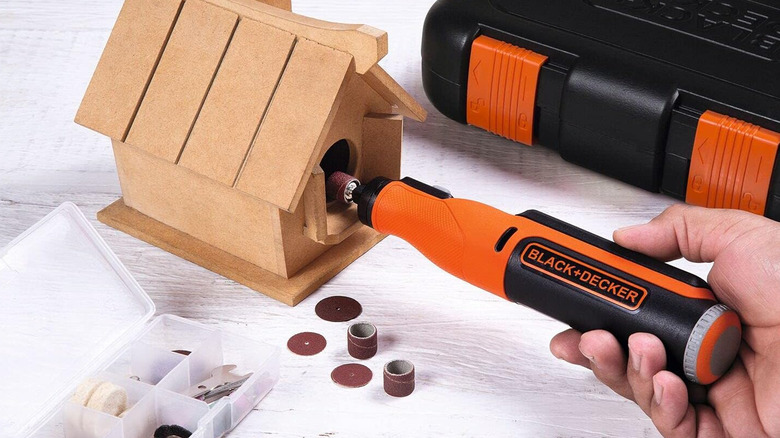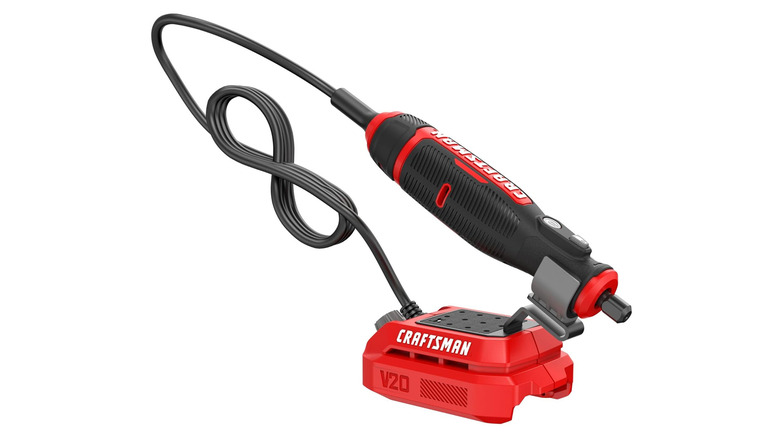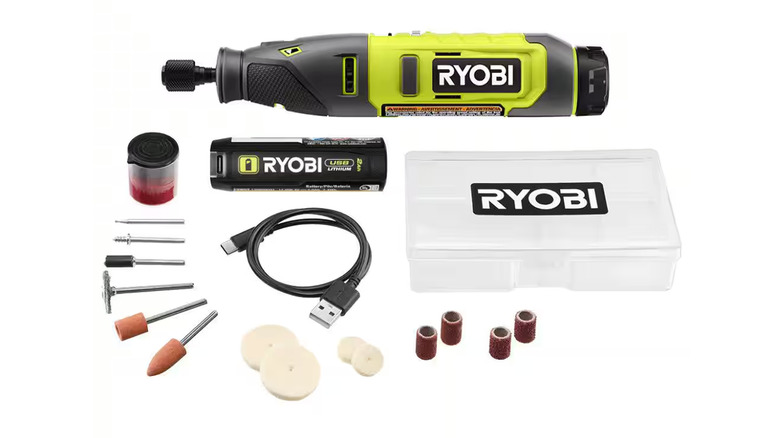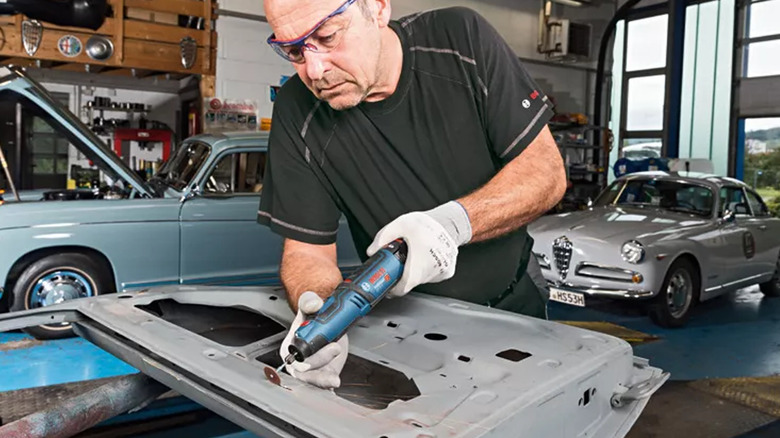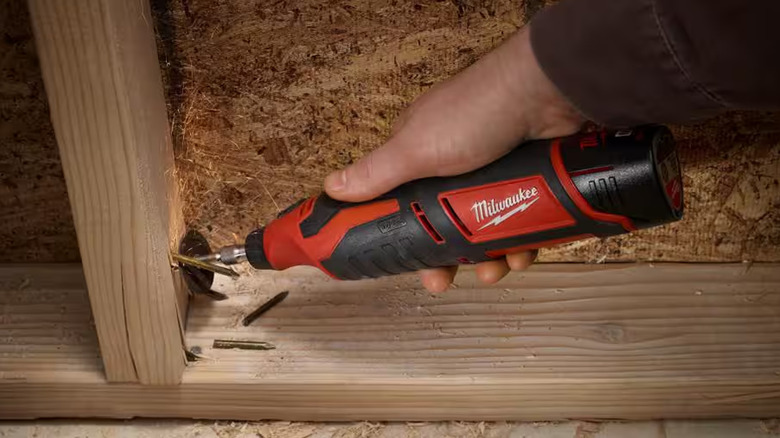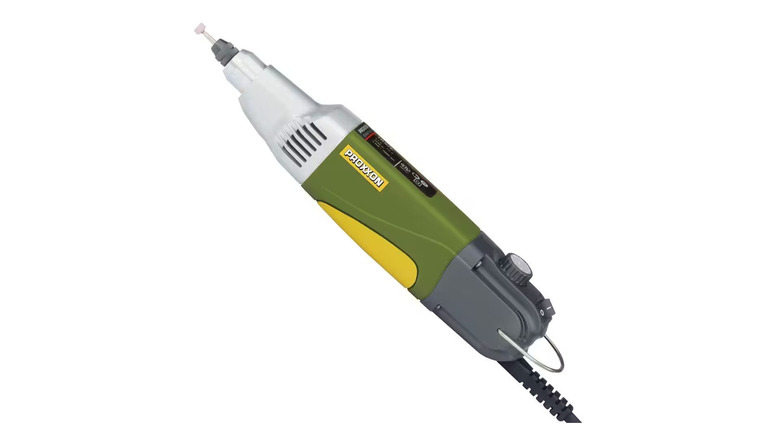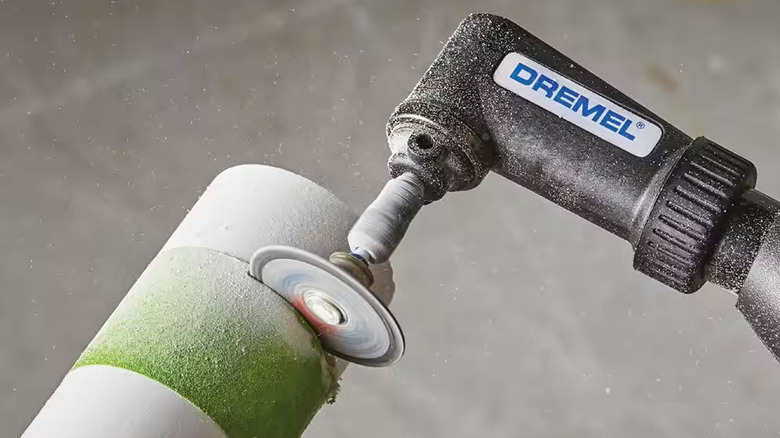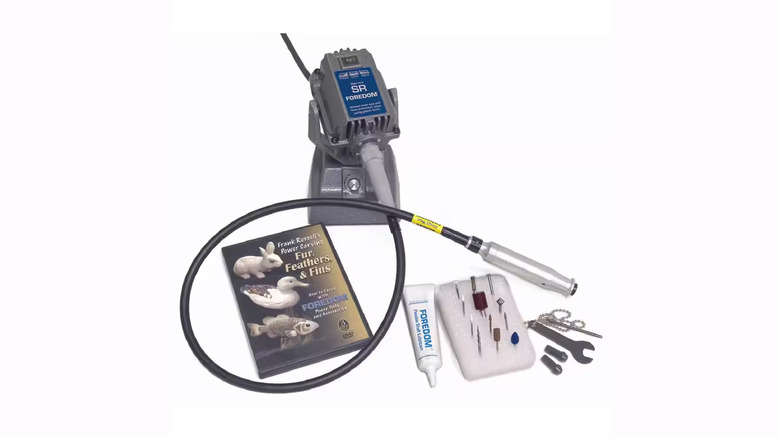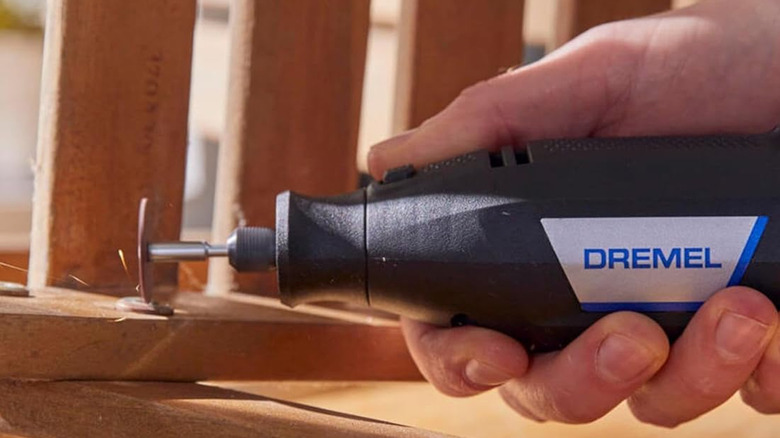Every Major Rotary Tool Brand, Ranked Worst To Best
We may receive a commission on purchases made from links.
Rotary tools are like the Swiss Army knives of the DIY world: compact, versatile, and ready for just about any task. From carving and sanding to engraving and polishing, they can handle it all. But with so many brands out there, choosing the right one isn't always easy. Whether in-store or online, buyers are bombarded with options, all claiming to be the best. Some live up to the hype, while others fall short. Nobody wants to waste money on a tool that overheats or wears out mid-project. Luckily, sticking with a trusted brand can save a lot of frustration. That's where this list comes in.
We've analyzed user reviews, brand reputation, and hands-on performance to rank the major rotary tool brands, from the weakest performers to the absolute best. Whether someone's a weekend hobbyist or a seasoned pro, this guide cuts through the clutter to spotlight the tools that are truly worth the investment.
14. Goxawee
Goxawee has become a popular choice on Amazon, mainly due to its affordable pricing and jam-packed accessory kits. For beginners exploring rotary tools, it's a welcoming entry point. Most kits come with over 100 pieces, including everything from sanding drums to cutting wheels and polishing pads, making it easy to try different tasks without buying extra add-ons.
However, Goxawee tools are best suited for light and occasional use. The motors are modest in power, and precision can be tricky during tasks that require steady speed or long runtimes. Cutting tougher materials or grinding for extended periods may cause the tool to strain or heat up.
That said, for casual crafting, light sanding, or hobbyist engraving, Goxawee holds its own. It's a great "starter" tool that lets users learn the basics without a big upfront cost. While most users agree that it's not built for heavy-duty work, it offers excellent value for those dipping their toes into DIY projects or creative tinkering.
13. Genesis
Not to be confused with Genesis, the car brand owned by Hyundai, this Genesis is a budget-friendly brand aimed at casual users who need a rotary tool for light-duty tasks. It's a no-frills option that handles the basics well and often comes bundled with essential attachments — all at a wallet-friendly price. For beginners or DIYers tackling quick jobs, it's a practical starting point. These rotary tools from Genesis are lightweight, easy to handle, and simple to operate, making them suitable for small repairs, crafting, or light sanding on softer materials like foam, plastic, or wood. For short sessions, Genesis can be surprisingly effective.
However, performance tends to dip when the workload increases. Some users have noted that the motor can slow down under pressure, and the tool may heat up quickly, depending on your use case. The power output isn't ideal for cutting through dense materials or handling heavy-duty tasks, so its use case remains fairly limited. Still, for those looking for a low-cost, beginner-friendly rotary tool for occasional projects, Genesis delivers solid value without overcomplicating the experience.
12. Phalanx
Phalanx rotary tool kits stand out for offering a huge variety of accessories at a budget-friendly price. From cutting wheels to sanding drums, the kits feel like a mini workshop in a box, making them ideal for users who want to explore a range of tasks without buying separate add-ons. In fact, that value-packed approach is one of Phalanx's biggest strengths. It's a great starter kit for trying out engraving, light sanding, polishing, or grinding. Many tools also include variable speed control, adding flexibility when working on different materials.
Performance-wise, Phalanx tools are solid for light-to-moderate use, but they do have a few trade-offs. Some users report that the motor struggles under heavier loads, and certain attachments may wear down faster than expected. While not a long-term pro solution, it's a helpful option for hobbyists or DIYers who want an all-in-one setup without spending too much. Phalanx earns its place for delivering strong value and versatility, especially for beginners and casual users.
11. Wen
Wen has long been a go-to name in the budget power tool space — it pops up multiple times in our list of Home Depot tools worth buying under $50 — and its rotary tools carry on that legacy. Designed for simplicity and value, Wen's rotary tools are a solid pick for hobbyists or beginners looking to handle light tasks like carving, sanding, or general crafting. The ergonomics are user-friendly, and many kits include flexible shafts, making detailed work more manageable. Performance is also reliable for moderate use, especially on soft materials like wood, foam, or plastic. The tools are quite straightforward and easy to handle, making them perfect for quick projects or DIY touch-ups.
Wen tools aren't built for heavy-duty grinding or cutting through tougher materials like metal or ceramic. Some users also find the included accessories to be less durable than those offered by premium brands. However, the brand still earns its place for offering dependable performance at an affordable price. It's a great option for casual users who want something versatile and easy to use, without spending too much upfront.
10. Workpro
Workpro's rotary tool kits usually strike a nice balance between price, performance, and features. Most Workpro rotary tools come with variable speed control, a comfortable grip, and a generous selection of accessories. Adding on to that, one of the highlights of Workpro tools is their overall sturdiness. While they're not quite "professional grade," they do feel more solid and refined than lower-ranked brands like Goxawee or Genesis. The power output is reasonable for most light to medium tasks, and users often report smooth motor operation and consistent results.
That said, there are still areas where Workpro has room to grow. For starters, multiple users have highlighted the kits' lack of advanced attachments or specialty tools offered by brands like Dremel or Proxxon. And while the performance is reliable, it doesn't quite hit the level of polish or precision needed for intricate detailing or heavy-duty use. There's also limited brand recognition, which can impact long-term trust and accessory availability. Still, for the average DIYer or weekend warrior, Workpro offers great value.
9. Hoto
Hoto is a fresh, design-focused brand that's quickly gained popularity, especially among younger DIYers who appreciate sleek looks and simple functionality. Originally known for its precision screwdriver made for Xiaomi, Hoto has since brought that same minimalist flair to its rotary tools. Unlike traditional bulky models, Hoto's rotary tools are compact, cordless, and styled more like a modern gadget than a power tool. They're intuitive to use, charge via USB-C, and run quietly, making them perfect for small-scale tasks like polishing jewelry, engraving glass, or light sanding on softer materials.
Despite their size, these tools are surprisingly capable. While they're not meant for heavy-duty jobs like cutting through steel or grinding concrete, they perform well on soft-to-medium materials. The cordless convenience also makes them ideal for tight spaces or portable use. The accessory selection is somewhat limited compared to bigger brands, but Hoto shines for its user-friendly design and fun, functional experiencethat consumers love. For casual crafters or style-conscious users, it's a standout option.
8. Black+Decker
Black+Decker is a household name, known for making reliable, affordable tools, such as the most popular handheld car vacuum on Amazon, and its rotary tools are no different. They're widely available, easy to set up, and beginner-friendly thanks to simple controls and comfortable grips. Most models offer variable speed settings, and compatibility with standard bits makes it easy to expand the kit over time. These tools are well-suited for small repairs, light crafting, or DIY hobby projects. For someone just starting out, they offer a solid out-of-the-box experience with enough flexibility for a range of casual uses.
However, most users agree that Black+Decker tools aren't built for heavy workloads. The motors can feel underpowered when pushed, and while the included accessories are functional, they don't offer the depth or durability of those from premium brands. Still, for everyday users who want something practical, dependable, and easy to use without breaking the bank, Black+Decker is a smart pick, and a great gift for anyone exploring the world of DIY.
7. Craftsman
Craftsman is a classic name in the tool world, even though it's now owned by Stanley Black & Decker. Its rotary tool is a compelling option in the cordless rotary tool market, particularly for DIY enthusiasts and hobbyists already invested in the V20 battery platform. The Craftsman V20 CMCE030B tool provides the convenience of cordless operation, granting users portability and flexibility without the constraints of a power cord. The inclusion of a variable speed dial, ranging from 6,700 to 34,000 RPM, allows for precise control across various applications like cutting, sanding, polishing, and engraving.
Furthermore, it comes equipped with a useful set of 33 accessories and a built-in tip holder, offering good value and organization for users tackling diverse projects. The 4-foot cord connecting the tool to the battery enhances maneuverability. While some user reviews indicate potential issues with the tool shutting off under load, many others praise its ease of use, portability, and suitability for small to medium-duty tasks. For those seeking a cordless rotary tool, Craftsman's offering presents a viable option, balancing functionality and convenience.
6. Ryobi
Ryobi has released a lot of well-liked affordable tools for DIYers, and its rotary tools show why. Striking a great balance between performance and price, Ryobi's tools — especially the cordless models — are reliable, easy to use, and a perfect fit within the brand's ONE+ battery system. For those already using Ryobi tools, adding a rotary tool means no extra chargers or battery clutter. The build quality is also solid, with sturdy construction and a comfortable, well-balanced design. Additionally, variable speed settings provide good control, making Ryobi tools well-suited for medium-level tasks like polishing metal, cleaning grout, or carving into wood.
While it may not offer the ultra-fine control of Proxxon or Dremel's deep accessory catalog, Ryobi delivers dependable performance for most day-to-day projects. In fact, the brand's tools are made by the same team that also makes products for Milwaukee, Homelite, and several other tool and small home appliance brands. It's an excellent pick for hobbyists, homeowners, and tinkerers who want cordless flexibility and consistent results. If the goal is to stay within a trusted tool ecosystem and upgrade from entry-level performance, Ryobi's rotary tools are a practical and powerful step forward.
5. Bosch
Bosch is a powerhouse in the global power tool market, known for German engineering, durability, and professional-grade performance. When it comes to rotary tools, though, Bosch's presence in the U.S. is surprisingly limited — it offers just one cordless rotary tool here. The Bosch GRO 12V-35 is a compact, high-precision tool designed for light to medium-duty tasks. It's quiet, smooth, and features excellent speed control, making it well-suited for engraving, light grinding, or sanding work.
However, it's worth noting that while Bosch's general-purpose rotary tool offerings are slim in the U.S., it does offer more powerful rotary-based machines, including rotary hammers and cutout tools designed for more heavy duty applications. These are commonly used by pros in construction and remodeling, showing that Bosch hasn't left the rotary space — it's just shifted its focus toward more specialized, high-powered tools.
Bosch tools are well-built, ergonomically comfortable, and designed to last. But the limited accessory ecosystem and slightly higher pricing might deter casual users. Still, for serious hobbyists and tradespeople who already trust the Bosch brand, or need a tool that feels refined and dependable, Bosch remains a smart, albeit niche, pick in the rotary tool world.
4. Milwaukee
Milwaukee is known for its rugged, heavy-duty gear built to withstand the demands of professionals, and its rotary tools are no exception. If there's one word that sums up the brand's approach, it's power. Milwaukee's rotary tools don't mess around when it comes to grinding, cutting, or sanding, thanks to the higher torque when compared to its competition. With a strong motor and the efficiency of brushless technology (in some models), Milwaukee's tools are geared toward heavy usage — be it cutting off rusted bolts, deburring metal edges, or shaping dense wood. The performance is consistent, and the battery life is excellent, especially when paired with high-capacity M12 packs. However, while powerful, user reviews across a few of different rotary tool models have raised some concerns about how they hold up under all that horsepower — don't be surprised if you've got to buy a replacement bit every now and then, or if the tool starts to rattle a little.
However, Milwaukee's rotary tools do have a specific personality. They're not designed with fine detail work in mind. While excellent for high-demand jobs, they can feel a bit bulky or overpowered when trying to do delicate carving or engraving. Then again, it's perfect for construction workers, mechanics, and serious DIYers who prioritize strength and cordless flexibility over compact form factor.
3. Proxxon
If precision had a brand name, it might just be Proxxon. Known for its ultra-detailed, finely engineered tools, Proxxon caters to model makers, jewelers, miniature painters, and anyone who works in millimeters rather than inches. And when it comes to rotary tools, it offers something quite different from the average home-use power tool. From the moment one picks up a Proxxon rotary tool, the difference should be obvious — they're slim, lightweight, and incredibly balanced. The tools hum quietly, with motors that prioritize consistent speed and vibration-free operation over brute force. That's exactly what makes them ideal for delicate tasks like etching glass, detailing model trains, or working with circuit boards. They may not come bundled with a huge assortment of accessories, but what's included is high quality.
Proxon is regarded as one of the best Dremel rotary tool alternatives. That being said, its range isn't perfect, or that diverse. Its rotary tools aren't designed for power users who need to cut through steel or grind away large surfaces. They're also not the most affordable, especially when compared to generalist brands. But for professionals and enthusiasts who want complete control over their craft, that extra investment is well worth it.
2. Dremel
Say "rotary tool," and chances are Dremel is the first name that comes to mind. Dremel practically invented the category, and has spent decades refining it. Its rotary tools are everywhere, from home garages and craft rooms to professional workbenches. Interestingly, if you've ever wondered who makes Dremel tools, it's none other than Bosch (which probably explains why the German brand offers so few rotary tools in the U.S.).
For most users, Dremel hits the sweet spot between versatility, performance, and ease of use. One of its biggest strengths is the variety it offers, ranging from compact cordless models like the Dremel Lite to more powerful options like the 4300 series. Whether it's sanding furniture, cutting PVC, engraving leather, or polishing silverware, Dremel tools are up to the task.
Just as impressive is Dremel's massive accessory ecosystem. With hundreds of attachments — including flex shafts, right-angle heads, and workstations—a single tool can be adapted for dozens of different jobs. The tools themselves are well-balanced, ergonomic, and comfortable to use over long sessions. While it may not match the ultra-fine precision of Proxxon for highly detailed work, that's a small trade-off. Dremel is the rotary tool equivalent of a multitool: adaptable, reliable, and trusted by everyone from beginners to seasoned pros.
1. Foredom
When it comes to professional-grade rotary tools, Foredom sits at the top of the food chain. This brand isn't just respected in the rotary tool space, it's revered. Trusted by jewelers, woodcarvers, dental technicians, and serious craftsmen, Foredom's rotary tools are built for exceptional performance over the long haul. They operate on a different system than typical handheld rotary tools. The motor is a separate, powerful unit that connects to the handpiece via a flexible shaft. This design offers several advantages, such as reducing hand fatigue, delivering superior torque, and allowing for longer sessions with precise control.
And if that wasn't enough, users get the added luxury of a foot pedal for variable speed control, just like a sewing machine. That kind of responsiveness is incredibly useful for detailed, pressure-sensitive tasks. Additionally, Foredom's lineup is modular and upgrade-friendly, which gives professionals the ability to customize their setup to match specific needs. What's more is that the motors are durable, the handpieces are balanced and smooth, and even the included accessories are top-tier. These tools are designed to last years, if not decades, with proper care.
Of course, all of this comes with a price tag that is hundreds of dollars higher than mainstream brands. Additionally, the learning curve can be steeper for first-time users, making it an overkill for most users. But for professionals or serious hobbyists who demand precision, endurance, and customization, Foredom is absolutely worth the investment.
Methodology
Our rankings are based on several key factors, starting with build quality, motor performance, and overall ease of use. We also considered how well each tool fits different user levels, from total beginners to experienced professionals. This list is backed by our own hands-on experience, using a variety of rotary tools in real-world projects. In addition to firsthand testing, we analyzed user reviews from platforms like Amazon, Home Depot, Walmart, and tool forums to understand how these tools perform over time and across a wide range of tasks. We also looked closely at included accessories, overall versatility, and compatibility with third-party attachments. Finally, price-to-performance played a big role. A tool doesn't need to be expensive to be great — it just needs to deliver consistent results and solid value. It's also worth noting that while premium brands like Makita and DeWalt are highly respected in the power tool space, their rotary offerings focus more on rotary hammers and drills rather than general-purpose rotary tools, so they were not included in this specific ranking. This approach helped us rank each brand fairly, based on what actually matters to most users.
